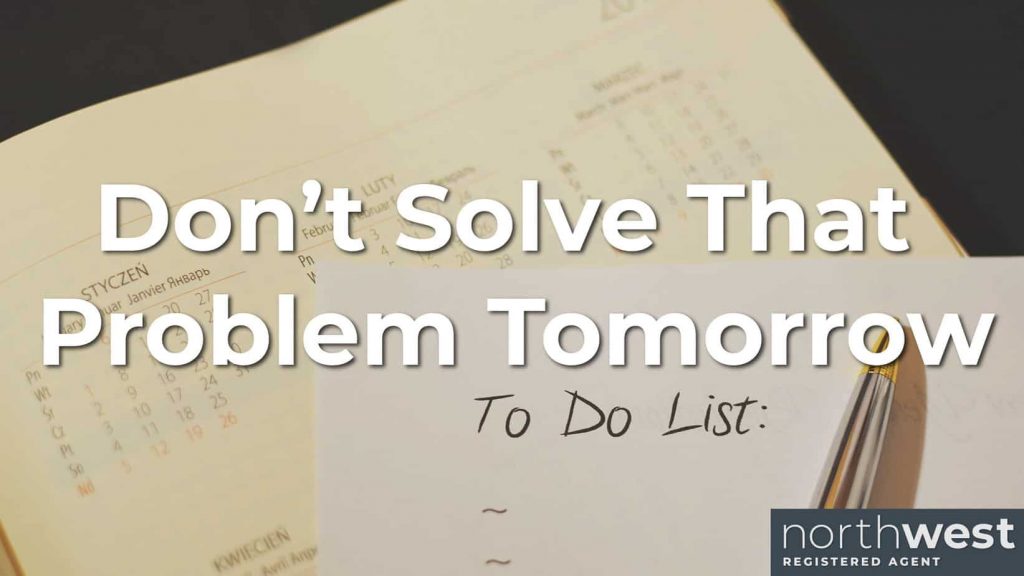Don’t Solve That Problem Tomorrow

Do it today. You can thank me… later.
“Do it. Just. Do. It.” -Shia LaBeouf
It’s not exactly laziness. It’s not exactly lack of motivation. It’s been around since the dawn of time, thus we know it’s not a new phenomenon. So what exactly is procrastination? James Clear, author of Atomic Habits describes it as this: “Procrastination is the act of delaying or postponing a task or set of tasks… it is the force that prevents you from following through on what you set out to do.” Or, as our favorite motivational speaker, Shia LeBeouf, would say: It is the energy that stops you from, “Just. Doing. It.”
We’ve all participated in procrastination to some degree. When we know a deadline is looming on the horizon like a warship, and instead of preparing for attack, we actively seek out distractions–an incredibly easy thing to do considering we have an infinite amount of distractions beckoning to us from the distraction boxes we carry around with us all day, every day.
But what about those of us who make a lifestyle out of procrastination? What about those of us who claim we just “perform better under pressure”? Well, fret not. There’s hope for the chronic procrastinator yet. Before we get to some potential remedies, let’s delve a little deeper into why exactly we put ourselves through the torture of not completing important tasks when they need completed.
The Science Behind Doing it Later
Why is that we put off things we know we need to do and delay completing tasks that we know will make our lives better in the long run? It turns out we’re not just lazy slugs, oozing about our days. Procrastination has much more to do with psychology than time management. In a New York Times Article titled, “Why You Procrastinate (It Has Nothing to Do With Self-Control),” Charlotte Lieberman says this:
“Procrastination isn’t a unique character flaw or a mysterious curse on your ability to manage time, but a way of coping with challenging emotions and negative moods induced by certain tasks—boredom, anxiety, insecurity, frustration, resentment, self-doubt and beyond.”
It makes sense then, that prioritizing the alleviation of our “bad moods” regarding a certain task, instead of actually getting the task done creates a harmful cycle that persistently reiterates feelings of shame and low self-esteem. We may think that we are not good enough or that we don’t actually possess the skills to complete the task correctly, and then we feel even worse for not being the kind of “go-getter” that actually gets stuff done. We feel bad about the task, and then we feel bad about it again.
Present Self Versus Future Self: The Battle of a Lifetime
One could speculate that by putting off a task that we don’t want to do, we would feel better—even if just for a little while. Well, unfortunately, this is not the case. The reason? It has to do with our present self versus our future self. Some research refers to this tendency as “time inconsistency” or “present bias” and it affects everything from our economy to your gastrointestinal health. More on that later.
Here’s the gist of it: present bias occurs when people prioritize payoffs that are closer to the present time when comparing trade-offs between two future moments. This human behavior is completely acceptable and evolutionary programmed. Being primarily concerned with the here and now rather than the later has rewarded our species great dividends. Though this may be the case, it does not change the fact that a fundamental element of being a human is being able to understand that there exists a present self and a future self. (If not for this ability, the human race probably would not make art or have existential crises.)
The battle of present and future self is no more evident than when we set out to set goals. Whether it is weight loss, skill learning, or finally getting on top of all of the paperwork on your desk, you are imaging a future scenario that is better than the current because something has changed that solely you are in charge of changing.
The goal-setting phase is always the fun part because thinking about an imagined “better” future inherently creates a level of reward anticipation. Reward anticipation triggers a release of dopamine. If you’ve ever had a surge of positivity while color-coding your workout schedule with a half dozen brand new highlighters that you bought just for this task, then you know what I am talking about.
However, it often seems that the well of euphoria dries up the next morning, when it comes time to hop out of bed and lace up your sneakers at 5 AM. Why is this? Well, remember all that stuff that you planned for the future? The future is now my friend, and though your covers have ensnared you in their warmth, and you’re on your third reiteration of “Snooze,” you have an important choice to make—except this time you’re not using your future mind. Your present mind is at the helm and it is a lot harder to motivate and even harder to get it to look past immediate gratification.
Wait! Put Off Feeling Bad
If you have found yourself procrastinating for a day, a couple days, half a year, or more, take a moment to pause. Feeling bad about putting something off will only further the detriments of procrastination. Before you shame yourself into oblivion for having the motivation of a koala bear in a eucalyptus coma, breathe, and really chew on what emotions you’re feeling at the moment.
“In the case of procrastination, we have to find a better reward than avoidance—one that can relieve our challenging feelings in the present moment without causing harm to our future selves…” Lieberman writes, “One option is to forgive yourself in the moments you procrastinate.”
Lieberman goes on to cite a 2010 study that concluded that self-forgiveness allowed individuals to essentially move on from the bad emotions regarding their perceived abilities, to actually doing something productive. This seems to be a case necessitating “forgive and forget.”
Next time you notice that you’re avoiding a task, instead of beating yourself up, Lieberman encourages being nice to yourself. “Best of all,” she writes, “self-compassion doesn’t require anything external—just a commitment to meeting your challenge with greater acceptance and kindness rather than rumination and regret.”
Giving yourself the space of acceptance will allow you to move on to productivity with a more positive mindset. If you’re drowning in self doubt, try remembering that getting started is often the hardest part and focus on how you will feel about yourself when you complete the task at hand.
Don’t Sweat It
Another way you might consider handling the procrastination struggle is to remember that ultimately, no matter what terrible task is eating away at your soul, in the grand scheme of things, it’s probably not that big of a deal. That’s not to say that your emotions aren’t telling you otherwise. You may have worked yourself into a neurotic mess wondering whether you’ll be able to complete the task, if you actually can complete the task, or if something terrible will happen if you do or do not complete it. But truly, feelings are not facts. According to Dr. Hal Hershfield, author of the 2013 report Future self-continuity: how conceptions of the future self transform intertemporal choice:
“People also have a fundamental inability to project their thoughts and feelings into the distant future. One might think, for example, that life will be happier and brighter if this week’s lottery ticket is a winner; in a related fashion, assistant professors might view a future without tenure as bleak and depressing. But lottery winners and non-lottery winner are equally happy, and professors who fail to receive tenure still go on to lead meaningful, productive lives. In other words, people overestimate the degree to which they will feel good about a positive outcome and bad about a negative outcome.”
This all goes to say that when you stop clinging so hard to what you think the future ought to look like, you can approach productivity with a little more confidence. Consider the possibility that the negative outcomes you may be imagining are perhaps a little overestimated.
For the Sake of Your Health
Remember those stomach problems I referenced earlier? Yah, you may have procrastination to blame for that as well. In a study linking procrastination to health issues, Dr. Sirois, a psychological scientist from Bishop University in Quebec, posed that putting off important tasks because of their discomfort or lack of immediate reward (procrastination), lead to a whole host of stress-related health problems, including the quality of your gastrointestinal health. Sirois also suggests using self-compassion to mitigate the stress brought on by procrastination in order to reduce health impacts.
It might not be easy to consider your long term health when you’re already berating yourself for putting off scheduling your annual dentist appoint, but it may be a good idea to try. It’s incredibly hard to be a human who is constantly navigating a precarious balance of satisfying the present self while preserving the future self. It’s even harder to make sense of the fact that those two people are the same people. We would never dream of saying even a quarter of the things we say to ourselves to our friends or family, yet we beat the crap out of our own psyche on the daily because we don’t want to clean out our inbox. How about we give the self-brutality a break, even if only as a remedy for the perpetual stress-induced heartburn.
Finally, Emotions are Like Sheep
Imagine your brain as a lovely natural landscape, ripe with plenty of foliage of varied densities. Some parts are meadows, some parts are hills, and some are rough, ragged, mountainous terrain. Now, sprinkle a bunch of sheep throughout.
The sheep are your emotions. They are a valuable asset to the scenery and enrich the area greatly. However, they must be managed otherwise things get chaotic. Now, imagine the concept of “self-compassion” as a border collie. Toss that worker dog in the mix and let it gently nip at the heels of your negative feelings to get them back where they belong.
Compartmentalizing emotions and managing negativity with self-compassion will greatly reduce the stress surrounding tasks, and the stress of avoiding tasks—otherwise known as procrastination. Fear of failure can be a good thing, but not if it runs off into the mountains and bleats for hours on end. Get that sheep back in the pen. Same with perfectionism, rumination, self doubt, and so on and so forth. These emotions serve a purpose, however, managing that purpose will allow you to be in control of your self and your own productivity. Allow yourself the space and time to train your self-compassion border collie to round them up when they get too unruly.
Even if you don’t get around to it though, try not to feel too bad. It’s likely that, if you’ve read this far, on this blog, that you’re a motivated individual. So kudos to you, friend. Now, I think I’ll get back to those responding to those emails from last month…




